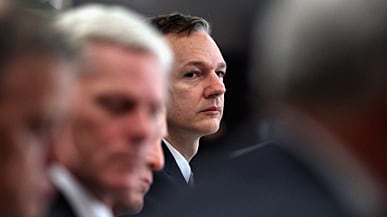Should Julian Assange be prosecuted? Now that WikiLeaks, for the second time in less than a year, has released thousands of national-security documents that the government of the United States had imagined were securely confidential, Washington has become preoccupied with the possibility of putting the Australian national behind bars.
To hear the nation’s leaders tell it, the release has been a catastrophe. Here is Secretary of State Hillary Clinton: “This disclosure is not just an attack on America—it’s an attack on the international community.” White House spokesman Robert Gibbs insisted that the “reckless and dangerous” act has put lives at risk. This level of outrage seems entirely appropriate to what Assange has done—although more lives were surely put at risk by the July release of military documents, some of which named Afghans and others secretly working for the United States.
Even if one shares the views of, say, Andrew Sullivan, who has suggested that much of the material, read carefully, is actually reassuring, the harm to the nation’s interests is plainly significant. It might be encouraging to learn that moderate Arab leaders, and not just American neocons, want Iran’s nuclear capability destroyed, or that countries where terror groups are active, whatever they may say publicly, are actually relieved that our forces are within their borders, hunting the terrorists down.
Yet that very reassurance points to the damage Assange has done: In an age when diplomacy is of enormous importance, other nations have now learned that confiding in American diplomats is risky. We cannot keep the world’s secrets. The Obama administration, then, would be poorly positioned indeed were it to insist, on the one hand, that quiet diplomacy is the way to resolve international crises, and, on the other, to stand aside, hands wringing, when the contents of those conversations become public.
Consequently, it is easy to see why leading administration figures, along with politicians and pundits from both sides of the aisle, are publicly musing about the possibility of prosecution. It is easy to share the frustration that makes our leaders want somehow to “get” Assange and WikiLeaks. And, contrary to much expert opinion, I think the United States has an excellent chance for a successful prosecution. But I also believe, strongly, that it would be a mistake to try. As much harm as a man like Assange might do, the damage to our values by trying to put him behind bars would be worse.

1. Could we prosecute Assange?
I think we could. Most of the conversation has centered on the Espionage Act of 1917. Assange’s violation seems fairly clear. The statute bars the “unauthorized” possessor of a document who “has reason to believe could be used to the injury of the United States or to the advantage of any foreign nation” to communicate or transmit the document “to any person not entitled to receive it.” (Title 18, § 793(e) of the United States Code)
• Leslie H. Gelb: WikiLeaks Accidentally Helps the U.S.• James C. Goodale: How the State Dept. Can Stop the Next WikiLeaks• 9 Most Shocking WikiLeaks SecretsDespite the clear language of the Espionage Act, some authorities doubt that Assange could be convicted. One argument is that Assange’s actions do not satisfy the statutory criterion of willfulness. The Supreme Court, in Hartzel v. United States, decided in 1944 at the height of World War II, ruled a defendant under the statute acts willfully when he acts “deliberately and with a specific purpose to do the acts proscribed by Congress.” This approach easily sweeps Assange and WikiLeaks into its ambit. Assange can hardly pretend to lack the intention of disseminating secrets to people not entitled to possess them. Nor, given the responses to his earlier publications, can he seriously argue that he was unaware of any potential harm.
Another worry is whether the Espionage Act applies to acts committed beyond the nation’s borders. For practical purposes, this is a question of congressional intent, and the intent seems clear. The statute prohibits, for example, flying over, photographing, or sketching American vessels, planes, and military installations in order to obtain information about the national defense. It is difficult to imagine that Congress intended to outlaw surreptitious snapshots of the nation’s military bases at home but not abroad.
We might well be able to convict Assange. But it’s a bad idea.
True, there is some question as to whether another country, even in the face of American diplomatic pressure, would extradite Assange to face charges for what some would consider political offenses. Bear in mind, however, that courts are not always picky as to how the defendant winds up within their jurisdiction. In a pinch, Assange could be swept off the street and smuggled to American territory—that is, he could be kidnapped. Such an act might seem outrageous, and would certainly cause a diplomatic furor, but it is the Obama administration that has declared the release of the documents the equivalent of an attack on the United States. In a world where the president asserts the authority to target an American citizen for assassination, dragging a foreign national here against his will would seem to pale by comparison.
2. Should we prosecute Assange?
We might well be able to convict Assange. But it’s a bad idea. Let us concede that the various documents he has released have done a lot of damage. He cannot plausibly claim that his actions were necessary to expose some major government conspiracy or coverup; this is not the Pentagon Papers or Watergate. Assange is a maker of mischief and a seeker of publicity, exposing confidential material because he can. In this sense he is a nihilist, driven by no serious theory of governance or international relations, other than the creation of controversy. What Assange has done is little different from a person who illegally obtains the tax returns of leading journalists, and posts them online, showing how much money each earns, and from whom, and where each gives it away, all in order, he might say, to demonstrate their biases. Such an individual is worthy of condemnation, not celebration.
But acting callously, or self-interestedly, or narcissistically, ought not to be criminal, particularly when what is involved is, undeniably, speech. We should be deeply troubled by the notion that our government might be devising schemes to prosecute people for what they have said or written. The old cases had it right. Shouting “Fire!” in a crowded theater. Publishing the movements of troop ships in a time of war. Other than speech of that level, the only people who should be punished for disclosing secrets are those who have promised—in exchange, say, for government employment—not to do so.
Indeed, as several observers have pointed out, an interpretation of the Espionage Act sufficiently broad to encompass what WikiLeaks has done would surely cover as well the newspapers that have published the documents. If Assange’s actions have damaged the security of the United States, then the same argument presumably applies to The New York Times. Indeed, it is the publication of the documents by respected institutions of journalism, and not their posting on the Web, that provides sufficient imprimatur to stir the controversy.
The Espionage Act is a broadly written and scary statute. As Geoffrey Stone points out in a recent book, the statute was adopted precisely to chill dissent. Happily, the act has been enforced only rarely over the past half century. Rare is best. Dissent is the lifeblood of democracy, and should be carefully nourished, not scared into hiding. I have no trouble with pursuing the leakers who have done so much damage to the nation’s security; but those who publicize what is leaked are the symptoms, not the problem.
That doesn’t mean no measures should be taken against Assange. Even if we reject the overheated suggestion that we simply kill him, as we would a dangerous terrorist, we should still consider how to slow him down. Certainly the United States possesses the technical means to track him online and interfere with his communications. We can also pressure other countries to restrict his freedom of movement, a strategy the Supreme Court has upheld against First Amendment challenge, even when used against American citizens.
But the most obvious solution is to protect our secrets better. Leaks of information have become so common in Washington that we hardly bother to investigate most of them seriously. This approach should change. We should greatly enhance the penalties for leaks, especially of national-security information, and we should step up efforts to track down and prosecute the leakers. If Pfc. Bradley Manning, the alleged source of much of the material, is indeed proved guilty, his punishment should be harsh. That’s how one gets the incentives right. We should also employ various technologies that make it easier to track who had possession, even digitally, of leaked documents.
It is unfortunate that we live in a time when the hardest part of possessing a confidence often seems to be figuring out which of our colleagues or friends to tell first. Alas, the culture is what it is. We need to find ways to do a better job of protecting the nation’s secrets. But prosecuting those who publish those secrets—even if, as in the case of Assange and WikiLeaks, they seem to do so with venal motive—takes us onto shoals we would do better to avoid.
Stephen L. Carter is the William Nelson Cromwell Professor of Law at Yale, where he has taught since 1982. His seven nonfiction books include God’s Name in Vain: The Wrongs. His first novel, The Emperor of Ocean Park (2002), spent 11 weeks on the New York Times bestseller list. His twelfth book, The Violence of Peace: America’s Wars in the Age of Obama, will be published by Beast Books in January.






